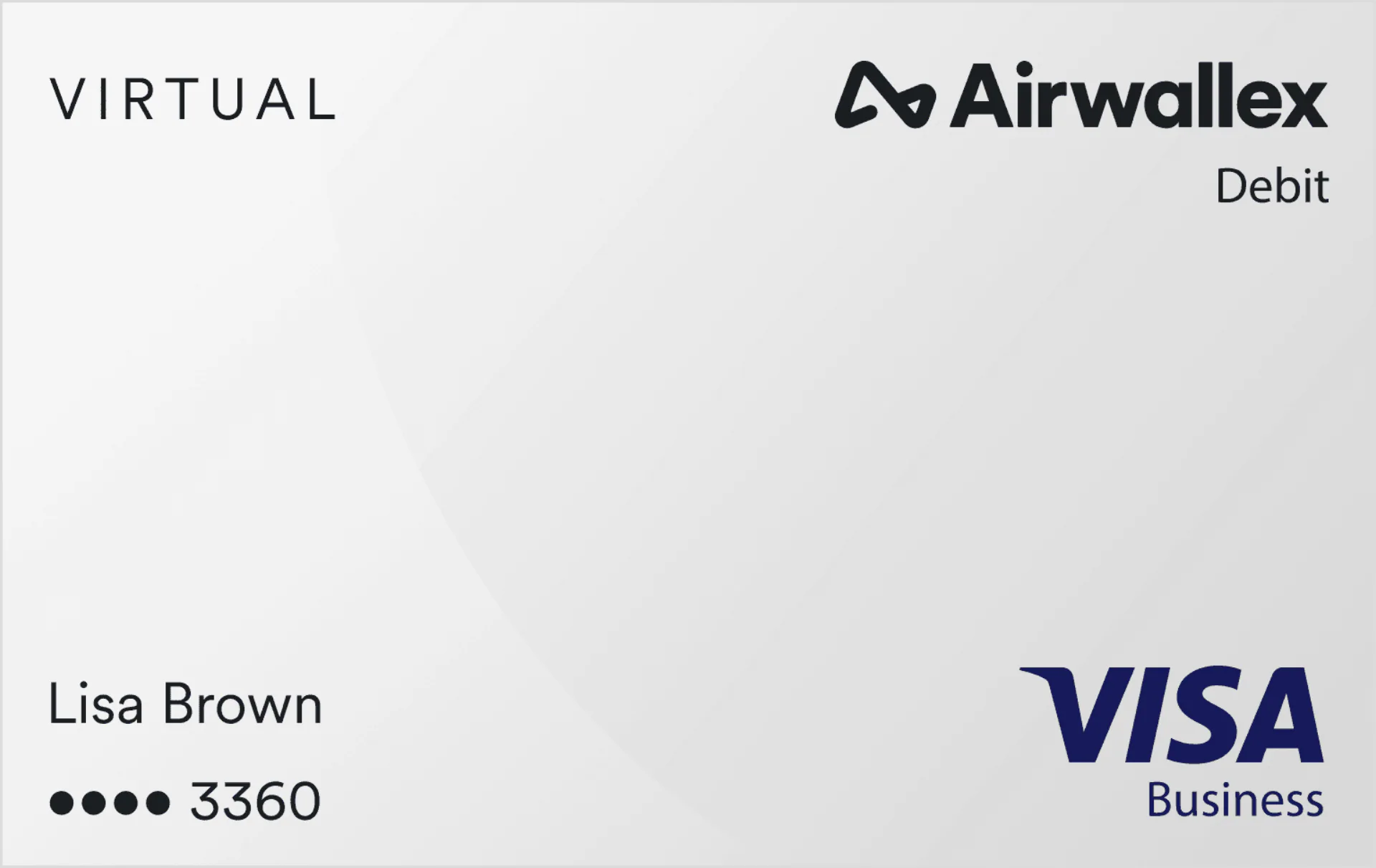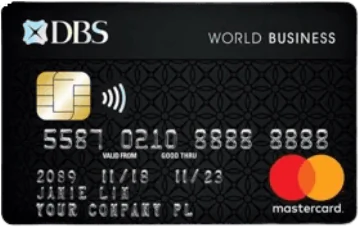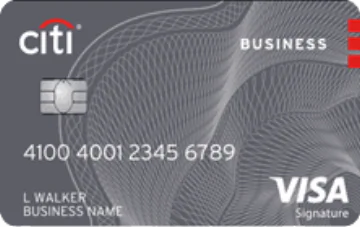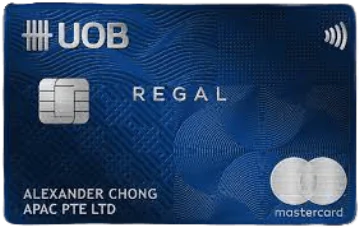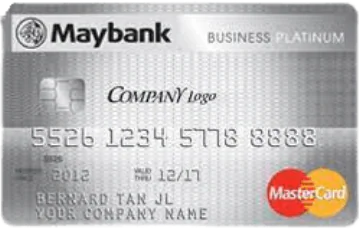Business Credit Cards Singapore 2026
Updated: 1 Jan 2026
Our Pick For Airport Lounge Access: American Express Singapore Airlines Business Credit Card
Our Pick For Office Expenses: Citi Business Card
- Get an additional business credit limit that is separate from your personal credit card.
- Earn 2X Citi ThankYou Points for every S$1 spent.
- Complimentary travel and corporate liability waiver insurance.
- Travel insurance
- No rebate cap
- No monthly spend required
- S$150 annual fee
- Min. income requirement for Singaporeans/PRs: S$30,000 & min. income requirement for Foreigners: S$60,000.
- Annual Fee required
Our Pick For Miles: Maybank Business Platinum Mastercard
- Consolidated Statements
- Enjoy up to 51 days of interest-free credit on purchases.
- Auto PayBIlls Programme that let's you earn TREATS Points for any charges.
- Flexible Credit Limits based on the company's profitability, unaffected by personal card limits.
- Complimentary business logo printing
- 2-year Annual Fee Waiver
- Low interest rate of 20% p.a.
- Global Concierge Services
- TREATS Points for every dollar spent.
- Complimentary Travel Insurance
- Worldwide withdrawal services
- Travel insurance
- Annual Fee waiver
- Installment
- No monthly spend required
- Strict requirements for business owners.
Our Pick for Rewards: UOB Regal Business Metal Card
UOB Regal Business Metal Card
- Unlimited access to over 1,300 airport lounges worldwide via DragonPass.
- 2% cash rebate on overseas spend.
- 1.5% cash rebate on local card spend.
- Complimentary travel accident insurance of up to US$500,000 for you and your family members.
- Exclusive dining, hotel, lifestyle, and medical perks.
- Accor Plus membership with exclusive benefit of stay four nights for price of three nights and auto-enrolment to Silver membership status in Le Club AccorHotels loyalty programme.
- Airport lounge
- Dining rebate
- Overseas rebate
- 0.3% cash rebate on utilities.
- S$686.36 non-waivable annual fee
- By invitation only
- Annual Fee required
Our Pick for Complimentary Travel Insurance: DBS World Business Card
- Up to S$1 million travel insurance coverage for accidental death of total permanent disability.
- 10 free airport lounge access per calendar year via Priority Pass.
- 2% cash rebate on foreign currency transactions.
- 1% cash rebate on local dining, entertainment, and travel transactions.
- Up to S$1.65 million employee misuse coverage.
- Airport lounge
- Local spending rebate
- Overseas rebate
- 0.3% cash rebate on other transactions.
- S$410.40 annual fee per year.
- S$80,000 income requirement.
- S$3,000 minimum monthly spend.
- Annual Fee required
Our Pick for Startups: Aspire Corporate Card
- Enjoy 1% cashback on eligible spends
- 0.7% foreign exchange fee
- Instant usage with virtual card
- Issue unlimited virtual corporate cards for free
- Get real-time spend notifications
- Gain access to exclusive benefits from partners
- Enjoy prompt customer support
- Only open to individuals who have a registered business in Singapore
Understanding Business Credit Cards in Singapore
Business credit cards in Singapore offer unique advantages for companies. When comparing options, it's crucial to grasp their benefits and how they differ from personal cards. Let's explore the key aspects of business credit cards to help you make an informed decision.
Benefits of Corporate Credit Cards
Corporate credit cards provide numerous perks for businesses in Singapore. They offer streamlined expense tracking, making accounting tasks easier. Many cards provide cashback on business-related purchases, helping you save money. Some even offer travel rewards, ideal for companies with frequent flyers who need to jet off to Changi Airport at a moment's notice.
How Business Credit Cards Differ from Personal Cards
Business credit cards are tailored for company needs, unlike personal cards. They often have higher credit limits to accommodate larger business expenses. These cards also offer specialised rewards programmes focused on business-related spending categories.
|
Feature |
Business Credit Card |
Personal Credit Card |
|---|---|---|
|
Credit Limit |
Higher (S$50,000+) |
Lower (S$10,000-S$30,000) |
|
Business expenses |
Personal spending |
|
|
Expense Management |
Advanced tools |
Basic tracking |
Key Features to Look for in a Company Credit Card
When conducting a business credit card comparison in Singapore, consider these essential features:
- Rewards aligned with your business spending
-
Low annual fees and competitive interest rates
-
Expense management tools
-
Travel perks for business trips
-
Additional employee cards at no extra cost
By focusing on these aspects, you'll be better equipped to choose a card that suits your company's needs and maximises benefits. It's about being as strategic with your choice as you would be when choping a seat at a busy hawker centre!
Top Business Credit Cards Singapore 2024
Looking for the best corporate credit card Singapore has to offer? We've got you covered with our top picks for 2024. These cards cater to various business needs, from travel perks to cashback rewards.
The DBS Platinum Business Card stands out for its travel benefits as you'll enjoy complimentary travel insurance and annual coverage of employee misuse. It's ideal if your business involves frequent overseas trips!
For rebates/cashback enthusiasts, the OCBC Business Credit Card is a winner. Earn up to 3% rebate at selected eco-friendly merchants, 1% on foreign currency transactions and 0.2% on SGD transactions. Similarly, the UOB Business Platinum Card offers flexibility with its UNI$ rewards programme. If you'd like to convert points to miles or use them for dining and shopping vouchers, this card suits businesses with diverse spending patterns.
The American Express Singapore Airlines Business Credit Card is also a good choice for companies with high travel expenditures. You can earn KrisFlyer miles on all spending and enjoy priority check-in and boarding, making your business trips as smooth as possible.
|
Card Name |
Key Feature |
Best For |
|---|---|---|
|
DBS Platinum Business Card |
Frequent travellers |
|
|
OCBC Business Credit Card |
Up to 3% rebates |
Eco-friend merchants |
|
UOB Business Platinum |
Flexible rewards |
Diverse spending |
|
KrisFlyer miles earning |
Air travel-heavy business |
Choose the best corporate credit card Singapore offers based on your company's spending habits and priorities. Remember to compare annual fees and interest rates before making your decision.
Comparing Business Credit Card Offers in Singapore
When choosing a business credit card in Singapore, it's crucial to compare different offers. This business credit card comparison will help you find the best fit for your company's needs, ensuring you're as prepared as a Singaporean with an umbrella during rainy.
Annual Fees and Interest Rates
Annual fees for business credit cards in Singapore range from S$0 to S$500. Interest rates typically fall between 24% and 28% per annum. Some cards offer waived fees for the first year or with minimum spend requirements, giving you more bang for your buck than a plate of nasi lemak at your favourite hawker centre.
Rewards Programmes and Cashback Options
Many cards provide rewards points or miles on purchases. Cashback options usually offer 1% to 5% on specific spending categories. Some cards have tiered rewards systems, increasing benefits as you spend more. It's like getting extra chilli with your chicken rice - the more you order, the spicier it gets!
Travel Perks and Insurance Coverage
Business travellers can benefit from complimentary airport lounge access, travel insurance, and rental car coverage. Premium cards often include higher coverage limits and additional perks like concierge services. These benefits can make your business trips as comfortable as a staycation at Marina Bay Sands.
Credit Limits and Spending Controls
Credit limits vary based on your business's financial standing. Many issuers offer tools to set spending limits for employees and track expenses in real-time, giving you more control than a seasoned uncle manning the BBQ at a family gathering.
Feature | Standard Card | Premium Card |
|---|---|---|
Annual Fee | S$150 | S$400 |
Interest Rate | 26% p.a. | 24.5% p.a. |
Rewards Rate | 1 point per S$1 | 1.5 points per S$1 |
Cashback | Up to 3% | Up to 5% |
Travel Insurance | S$500,000 coverage | S$1,000,000 coverage |
Remember, the best business credit card for your company depends on your specific spending patterns and needs. Consider these factors carefully in your business credit card comparison to make an informed decision.
How to Choose the Best Business Credit Card for Your Company
Selecting the best business credit card in Singapore requires careful consideration of your company's unique needs. Start by analysing your spending patterns and cash flow requirements. Do you frequently travel for business or make large purchases? A card with travel rewards or high credit limits might suit you best, much like how a good plate of Hokkien mee suits a hungry Singaporean.
Consider your company size and growth plans. Startups might benefit from cards offering lower fees and flexible payment terms, while established firms could leverage premium cards with extensive perks.
You should try to Evaluate industry-specific needs as retail businesses might prioritise cards with high cashback rates on inventory purchases, whilst tech companies could favour cards offering rewards on software subscriptions.
Compare different card options using this checklist:
-
Annual fees (or annual fee waivers) and interest rates
-
Rewards programme alignment with spending
-
Cash flow management features
-
Integration with accounting software
Remember, the best business credit card in Singapore for your company should align with your financial goals and operational needs. Take time to research and compare options before making your decision, just as you would carefully consider your choices at a bustling hawker centre.
|
Company Type |
Recommended Card Features |
|---|---|
|
Startups |
Low fees, flexible payment terms |
|
Established Firms |
Premium perks, high credit limits |
|
Retail Businesses |
High cashback on inventory purchases |
|
Tech Companies |
Rewards on software subscription |
Applying for a Business Credit Card in Singapore
Securing a credit card for company use in Singapore involves a straightforward process. You'll need to meet specific eligibility criteria and provide essential documents to support your application, much like preparing all the necessary ingredients before whipping up a perfect plate of char kway teow.
Most banks require your business to be registered in Singapore and have a minimum annual turnover. The exact figure varies, but it's typically around S$100,000 to S$200,000. Your company should also have been operating for at least one year, proving it's more established than the latest bubble tea trend.
When applying, be prepared to submit:
-
ACRA business profile
-
Latest financial statements
-
Directors' and shareholders' identification
-
Income tax returns
Banks assess applications based on your company's financial health, credit history, and industry sector. They may also consider the personal credit scores of directors or guarantors, scrutinising them as closely as a Singaporean auntie inspects fresh produce at the wet market.
The approval timeline for a business credit card in Singapore usually ranges from 1 to 3 weeks. Some banks offer expedited processing for existing customers, making the process smoother than gliding down the lazy river at Adventure Cove Waterpark.
Remember, each bank has its unique evaluation process. It's wise to compare offers from different institutions to find the best credit card for your company's specific needs, just as you would compare various stalls before deciding where to get your favourite laksa.
Conclusion
Selecting the right business credit card in Singapore can significantly impact your company's financial health and growth. As you've seen, these cards offer a range of benefits tailored to business needs, from cashback rewards to travel perks and expense management tools. They're as essential to your business success as a well-timed "chope" is to securing a table at a busy hawker centre.
When choosing a business credit card in Singapore, consider your company's spending patterns, financial goals, and operational requirements. Look for cards that align with your business model, whether you're a frequent traveller, heavy spender, or startup looking to build credit. The right card should complement your business strategy as perfectly as kaya complements toast in a traditional Singaporean breakfast.
Remember, the best business credit card for your company is one that offers a balance of rewards, fees, and features that complement your financial strategy. By carefully evaluating your options and leveraging the benefits of a well-chosen business credit card, you can enhance your company's purchasing power and streamline financial operations in Singapore's dynamic business landscape. With the right card in your wallet, your business will be as well-equipped as a Singaporean leaving home with an umbrella, ready for whatever challenges come your way!
Frequently asked questions
Business credit cards in Singapore offer several advantages, including separating personal and business expenses, earning rewards on business spending, accessing higher credit limits, and enjoying additional perks like travel insurance and purchase protection. It's like having a Swiss Army knife for your business finances!
Business credit cards are designed specifically for companies and offer features tailored to business needs, such as higher credit limits, employee spending controls, and detailed expense reporting. They also provide additional rewards and benefits geared towards businesses, much like how a nasi lemak set offers more variety compared to just a plate of rice.
When choosing a business credit card in Singapore, consider factors like annual fees, interest rates, rewards programmes (such as cashback or air miles), travel benefits, insurance coverage, credit limits, and spending controls for employees. It's about finding a card that fits your business as perfectly as a well-tailored suit.
To compare business credit card offers, evaluate factors like annual fees, interest rates, rewards programmes, cashback options, travel perks, insurance coverage, credit limits, and spending controls. Look for a card that aligns with your company's specific needs and spending patterns, just as you would carefully select ingredients for your favourite local dish.
Consider your company's size, industry, spending patterns, cash flow needs, and specific requirements when selecting a business credit card. Evaluate options based on annual fees, rewards, credit limits, and additional features that can benefit your business operations. It's about finding the perfect match, like pairing kopi with kaya toast.
To apply for a business credit card in Singapore, you'll typically need to meet eligibility criteria set by the issuing bank, provide required documents (such as business registration and financial statements), and undergo an evaluation process. Approval timelines may vary, but the process is generally as smooth as ordering your favourite hawker dish.
Yes, some additional relevant keywords include corporate credit cards, company credit cards, business credit card fees, business credit card rewards, and business credit card eligibility. Knowing these terms will help you navigate the world of business credit cards as expertly as a local navigates the MRT system.
The information on this page is for educational and informational purposes only and should not be considered financial or investment advice. While we review and compare financial products to help you find the best options, we do not provide personalised recommendations or investment advisory services. Always do your own research or consult a licensed financial professional before making any financial decisions.
